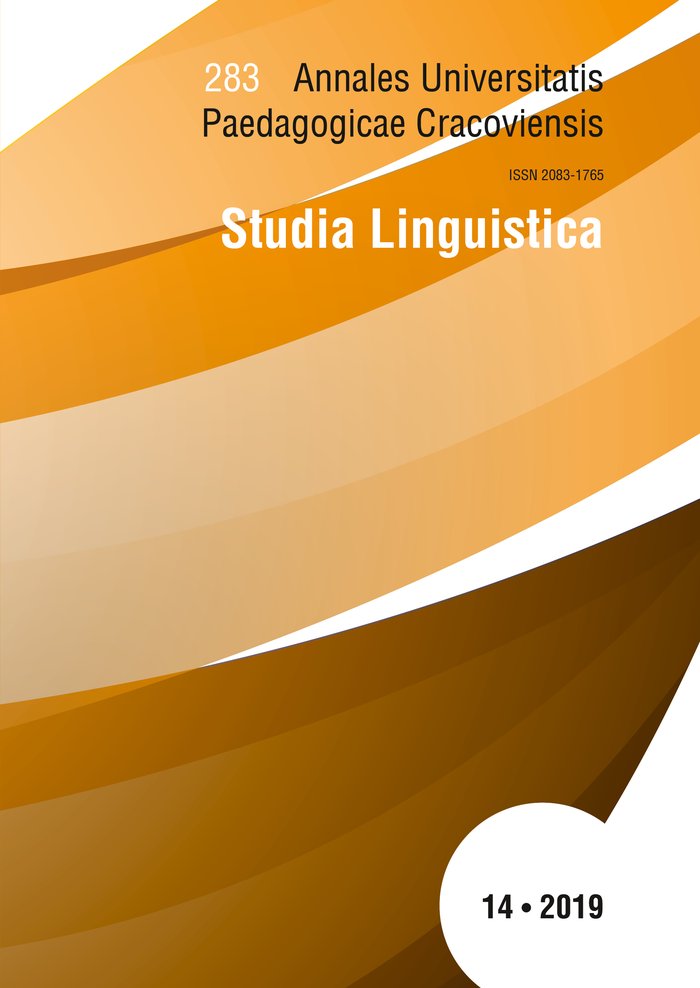Identity of the writer in the old scientific text based on the analysis of Janusz Korczak’s pedagogical manifesto How to love a child. A child in the family
Main Article Content
Abstract
The article concerns the writer’s identity in the old scientific text in the light of Janusz Korczak’s work How to love a child. A child in the family. Attention was also paid to the roles which the author plays in the text. He is identical with the author of the work and he is a doctor, educator and philosopher. The article also discusses the emotional involvement of the author and his pedagogical passion. The history of the book creation was discussed, and then the language forms, through which the subject of the text was revealed, were shown.
Downloads
Article Details

This work is licensed under a Creative Commons Attribution-NonCommercial-NoDerivatives 4.0 International License.
Author, submitting a text to the editorial board of the journal “Annales Universitatis Paedagogicae Cracoviensis. Studia Linguistica", certifies that the content of the article has not been published so far and that the work does not violate in any way the copyright or related rights of other person, as well as other rights of third parties, and that no one's rights to the work (or any part thereof) have been missed. After signing the contract, the property rights to the published materials are transferred to the Scientific Publisher of the University of the National Education Commission, Krakow.
“Annales Universitatis Paedagogicae Cracoviensis. Studia Linguistica” is an open access journal, and all its content is made available free of charge to users and institutions under the Creative Commons CC-BY-NC-ND 4.0 license (attribution, non-commercial use, no derivative works). Under this license, the authors agree that their work may be lawfully reused for any purpose, except for commercial purposes, without the prior consent of the author or publisher. Everyone can read, download, copy, print, distribute and process these works, provided that the author's marking and the original publication place are correct. Published texts may not be used to create derivative works (e.g. to translate and publish in another language without the consent of the publisher). This is in line with the BOAI (Budapest Open Access Initiative) definition. "Studia Linguistica" does not charge for submitting or processing articles.
References
Bartkowiak E., 2013, Wychowanie w rodzinie według Janusza Korczaka, „Wychowanie w Rodzinie”, t. VII (1/2013), s. 83−105.
Google Scholar
Biniewicz J., 2002, Kształtowanie się polskiego języka nauk matematyczno-przyrodniczych, Opole.
Google Scholar
Cichy E., 1993, Opracowanie tekstów, geneza utworów i uwagi o tekstach, [w: ] J. Korczak, Jak kochać dziecko. Momenty wychowawcze. Prawo dziecka do szacunku, Dzieła, t. VII, red. H. Kirchner, A. Lewin, S. Wołoszyn, M. Ciesielska, Warszawa.
Google Scholar
Gajda S., 2001, Styl naukowy, [w:] Współczesny język polski, red. J. Bartmiński, Lublin, s. 183–199.
Google Scholar
Gliczner E., 1558, Książki o wychowaniu dzieci barzo dobre, pożyteczne i potrzebne, z których rodzicy ku wychowaniu dzieci swych naukę dołożną wyczerpnąć mogą. Teraz nowo uczynione i z pilnością wyrobione, Kraków.
Google Scholar
Głowiński M., 1982, Literackość jako działanie pedagogiczne, [w:] Janusz Korczak. Życie i dzieło, Warszawa, s. 224–227.
Google Scholar
Grabias S., 1981, O ekspresywności języka. Ekspresja a słowotwórstwo, Lublin.
Google Scholar
Grabias S., 1994, Język w zachowaniach społecznych, Lublin.
Google Scholar
Kirchner H., 1982, Miejsce Korczaka w literaturze, [w:] Janusz Korczak. Życie i dzieło. Materiały z Międzynarodowej Sesji Naukowej. Warszawa, 12–18 października 1978 r., red. H. Kirchner, A. Lewin, S. Wołoszyn, Warszawa, s. 55–60.
Google Scholar
Korczak J., 1919, Jak kochać dziecko. Dziecko w rodzinie, Warszawa–Kraków.
Google Scholar
Korczak J., 1920, Jak kochać dzieci. Dziecko w rodzinie, Warszawa–Kraków.
Google Scholar
Korczak J., 1920, Jak kochać dzieci. Internat. Kolonje letnie, Warszawa–Kraków.
Google Scholar
Korczak J., 1920, Jak kochać dzieci. Dom Sierot, Warszawa–Kraków.
Google Scholar
Korczak J., 1929, Jak kochać dziecko. Dziecko w rodzinie, wyd. II, Warszawa–Kraków.
Google Scholar
Korczak J., 1929, Jak kochać dziecko. Internat. Kolonje letnie. Dom Sierot, wyd. II, Warszawa–Kraków.
Google Scholar
Korczak J., 1993, Jak kochać dziecko. Momenty wychowawcze. Prawo dziecka do szacunku, Dzieła, t. VII, red. H. Kirchner, A. Lewin, S. Wołoszyn, M. Ciesielska, Warszawa.
Google Scholar
Lewin A., 1999, Korczak znany i nieznany, Warszawa.
Google Scholar
Michalak M., 2012, Słowo wstępne, [w:] J. Korczak, Jak kochać dziecko. Dziecko w rodzinie, Warszawa, s. 5–9.
Google Scholar
Nowakowska-Kempna I., 1986, Konstrukcje zdaniowe z leksykalnymi wykładnikami predykatów uczuć, Katowice.
Google Scholar
Olszewska D., 2010, Czy język naukowy jest wyłącznie językiem „ratio”, „Studia Germanica Gedanensia” XXII, s. 169–175.
Google Scholar
Rejter A., 2018, Między podmiotowością tekstu a ewolucją dyskursu naukowego, [w:] W kręgu dawnej polszczyzny V, red. M. Mączyński, E. Horyń, E. Zmuda, Kraków, s. 11–22.
Google Scholar
Sieradzka-Baziur B., 2017, Terminologia pedagogiczna, [w:] Terminologia specjalistyczna w teorii i praktyce językoznawców słowiańskich, red. R. Przybylska, W. Śliwiński, Kraków, s. 197–211.
Google Scholar
Sieradzka-Baziur B., 2018, The evolution of scientific language of pedagogy on the example of Książki o wychowaniu dzieci [Books on children’s upbringing] by Erasmus Gliczner in the context of contemporary determinants of the language of science, „Przegląd Historyczno-Oświatowy” 3–4, s. 5–16.
Google Scholar
Starzec A., 1999, Współczesna polszczyzna popularnonaukowa, Opole.
Google Scholar
Szczaus A., 2015, Teksty naukowe i techniczne doby średniopolskiej jako źródło badań historycznojęzykowych, „Poznańskie Studia Polonistyczne”, Seria Językoznawcza, vol. 22 (42), nr 1, s. 253–268.
Google Scholar
Wierzbicka A., 1969, Dociekania semantyczne, Wrocław−Warszawa−Kraków.
Google Scholar
Wierzbicka A., 1971, Kocha, lubi, szanuje. Medytacje semantyczne, Warszawa.
Google Scholar
Wilkoń A., 2000, Typologia odmian językowych współczesnej polszczyzny, Katowice.
Google Scholar
Wołoszyn S., 1982, Korczak, Warszawa.
Google Scholar
